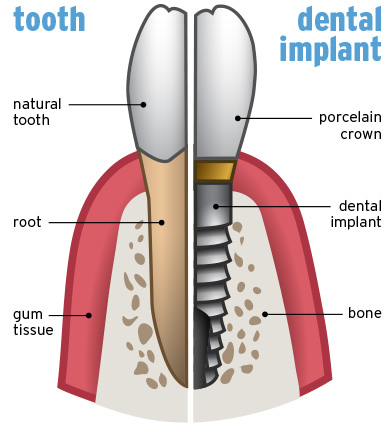
A Dental Implant is a replacement for the root of a tooth that has been lost as a result of periodontal disease, an injury or some other reason.
Dental implants are secured in the jawbone and, similar to tooth roots, are not visible once surgically placed and are used to secure crowns, bridges or dentures. While dental implants are beneficial to your social and psychological well-being by helping you smile and talk properly, their benefits go much deeper than that. Dental implants also help prevent the following problems:
 Loss of jaw bone
Loss of jaw bone
In addition to simply replacing lost teeth, implants help maintain the shape and density of the jawbone. Dental implants are made of titanium, which actually fuses to the jawbone, thus preventing loss.
Shifting of teeth
When a tooth is absent, the remaining teeth in your mouth shift to fill in the gap. Therefore, even if the missing tooth is in the back of your mouth where it's not noticeable, teeth that are visible may move as well causing a change in your appearance.
Difficulty keeping teeth clean
When teeth shift, they may overlap each other or extrude from the gum line, making it difficult to keep them free of plaque.
Grinding, clenching and painful jaw joints
These symptoms are also a result of shifting teeth. When your teeth change positions, problems with your bite may occur causing grinding and clenching to occur, which can lead to painful jaw joints.
Generally, if you have lost a tooth or multiple teeth then you are eligible for dental implants. However, some conditions may affect whether the implant will fuse to your bones properly. These conditions include diabetes, cancer, alcoholism, smoking, radiation of the jaw or uncontrolled periodontal disease. Make sure we are aware of your medical history and all medications so that a proper assessment can be made. We will go over all of this information in detail at your first visit.
If we determine that dental implants are a viable option for you, a surgical procedure will be required to place them in your mouth. Precision channels are created in the jawbone and then the implants are fitted into them so they are in intimate contact with the bone. Implants typically take two to six months to fuse to the bone before they can have the tooth restorations or crowns attached to them to complete the procedure. In certain situations however, you may be able to walk out of your appointment with a temporary crown. Once in place, keeping good oral hygiene by brushing and flossing is required. It is also important to visit your dentist so your implants can be cleaned with special tools that will not harm the metal surface. Your dentist will also need to monitor the implants to confirm that they are functioning adequately.
Contact Dental Solutions to see if dental implants are a viable solution for you!